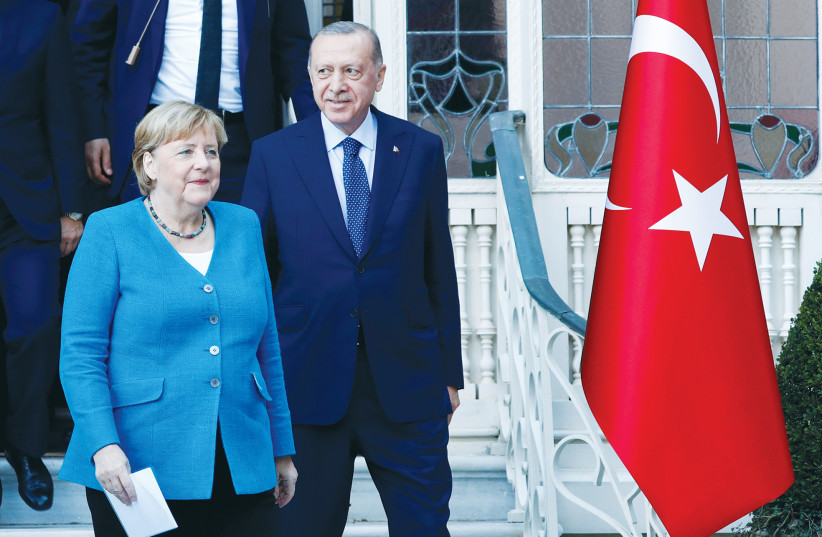Turkey’s President Recep Tayyip Erdogan has taken a leaf out of his ally Vladimir Putin’s book and threatened Greece with a missile strike.
In a recent speech in Samsun, the president spoke of the progress made by Turkey’s defense industry, which is now 80% domestic. As examples, he gave the Bayraktar TB2 UAVs, which have revolutionized the face of modern warfare, and the development of the Akinci UCAV (unmanned combat aerial vehicle).
Erdogan also mentioned that Turkey has started to produce its own missiles, which was a reference to the Tayfun (Typhoon) short-range ballistic missile test-fired in October. The SRBM traveled 350 miles; Athens is 138 miles from the nearest Turkish territory.
Erdogan went on: “You say Tayfun, the Greek is scared. He says it will hit Athens. Of course it will. If you don’t keep calm, if you buy stuff from America for the islands, from here and there, a country like Turkey will not sit idly by. It has to do something.”
The reference is to the Dodecanese islands, which were ceded to Greece in the 1923 Lausanne Treaty and the 1947 Paris Peace Treaty. The bone of contention is that Greece claims to be an archipelagic state like Japan, the Philippines and Indonesia.

Accordingly, it lays claim to the waters that lie six nautical miles from each island, which does not allow for any Turkish territorial waters in the Aegean Sea. Greece has extended its territorial waters in the Ionian Sea to 12 nautical miles, but Turkey has made it clear that a similar extension in the Aegean will be regarded as a casus belli (cause for war).
Conversely, Turkey regards Greece as a peninsular state and points out that some of these islands are on the Turkish mainland’s continental shelf, whereas the others lie mainly on the Greek continental shelf.
Turkey’s response was the formulation of the “Blue Homeland” (Mavi Vatan) maritime doctrine by two admirals, Cem Gurdeniz and Cihat Yayci. This doctrine lays claim to an expanse of 462,000 sq.km. in the eastern Mediterranean, Aegean and Black seas.
“Blue Homeland” ties in with Turkey’s expansive foreign policy, which has led to a modernization of its fleet. Former German chancellor Angela Merkel, the architect of the EU’s “constructive dialogue” and “positive agenda” toward Turkey, sanctioned the development of a fleet of modern submarines together with other arms deals.
German Foreign Minister Heiko Maas also opposed an arms embargo on Turkey, as he argued it would be “strategically incorrect” because of Turkey’s NATO membership. In addition, Turkey has constructed the TCG Anadolu, an amphibious assault ship, designed to operate inside Turkey’s spheres of interest.
The other bone of contention is Turkey’s demand that Greece demilitarize 16 of its 23 Aegean islands, which it claims is a breach both of the Lausanne and Paris Treaty. Greece in turn claims the right of self-defense in accordance with Article 51 of the UN Charter.
Turkey has vowed to “take the matters further,” and Erdogan upped the ante in Samsun. However, it would be a mistake to underestimate Turkey’s intentions. Two years ago it came to a clash between Greece and Turkey over the small Greek island of Kastellorizo off of Turkey’s south coast, and it was only through Berlin’s intervention that war was averted.
THERE IS no doubt how far Erdogan is prepared to go to ensure both his and the governing AK (Justice and Development) Party’s reelection in next June’s elections. One well-tried method is to play the national security card.
The Istanbul bombing in November has given Erdogan a pretext to justify air strikes on Kurdish positions in Iraq and northern Syria. He is also planning a fourth incursion into Syria to boost his approval ratings ahead of next year’s elections.
However, despite Erdogan’s appeal to Putin to green-light the operation, Russia is none too keen on this distraction in its backyard. Given Russia’s reluctance, Greece could be the next target. Against this background, the US plans to finalize the sale of 40 F-16 fighter jets and nearly 80 modernization kits to Turkey will add fuel to the flames.
In 1935, Winston Churchill regarded it as “the acme of gullibility” to trust in Germany’s protestations of peace. In the present situation, it would be the acme of irresponsibility to trust in Turkey’s.
The writer is an international adviser at the Research Institute for European and American Studies in Athens.
